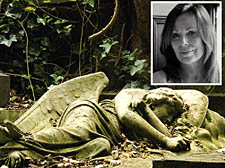| |

‘The dead come back in your dreams,’ says writer Rose Tremain (inset)
Photo: FLICKR/A.DRIAN |
Grief may be ‘un-British’, but expert counselling can help
Novelist Rose Tremain talks to Jane Masumy about the value of mourning, on the anniversary of an organisation that helps the bereaved
CRITICALLY acclaimed author Rose Tremain has spoken to the New Journal about death, grief and the power of counselling.
Ms Tremain, 66, who wrote the Orange Prize- winning novel The Road Home, has been promoting celebrations of 40 years of a central London bereavement service.
Her daughter Eleanor, 37, a former West End actress turned therapist, is one of 85 volunteers helping to run the counselling service for bereaved people in Camden, Islington and Westminster.
Ms Tremain said British culture struggled to cope with open grief.
“My daughter Ellie says that many clients who seek counselling lost a beloved person 10 years ago, but are looking for help now,” she said.
“They might not have been allowed to talk about the loss at the time.
“Ritual mourning isn’t part of our culture, everything has to be done in private.
“The British like to ‘get over it and move on!’
“Grief is tidal, it comes and goes.
“Even when you think you are doing well, the dead come back in your dreams. People who lose someone tend to feel a survivor’s guilt, a sense of shame that they are still alive.”
Ms Tremain said she was lucky enough to have only lost her parents.
She said: “That’s something you expect to happen at the age I’m at. Still,when my mother died a few years ago I felt a retrospective sadness that I could have spent more time with her since she was ill.”
Since 1969 thousands of people have benefited from free counselling from the Camden, City, Islington and Westminster Bereavement Service.
To celebrate its 40th anniversary, the independent charity organised a night of comedy, readings and music, called Another Hour More at the weekend.
Biographer Richard Holmes, actors Alison Steadman and Harriet Walter, were among those taking part.
Ms Tremain read a short story about death.
She has written widely about grief, partly inspired by conversations with her mother.
“It’s hard to say what goes directly from life experience into your writing, but my mother had a lot of grief, lost her brother to war and my father left her when I was 10.
“She was able to carry on, she was a robust person with a deep sadness.
“She felt like her parents had always loved her brother more and had lost the wrong child.”
So, has the author contemplated her own end – and whether her work will be remembered?
She laughs, saying: “You don’t know if you will still be read.
“Some people’s work resurges after their death. But I can say that I won’t have a feeling that I failed to do what I wanted to do.
“I knew as a small girl that I wanted to become a writer. I am happiest when I’m left alone scribbling.
“And I hope that will continue.”
|
 |
|
|
 |
| |
| |